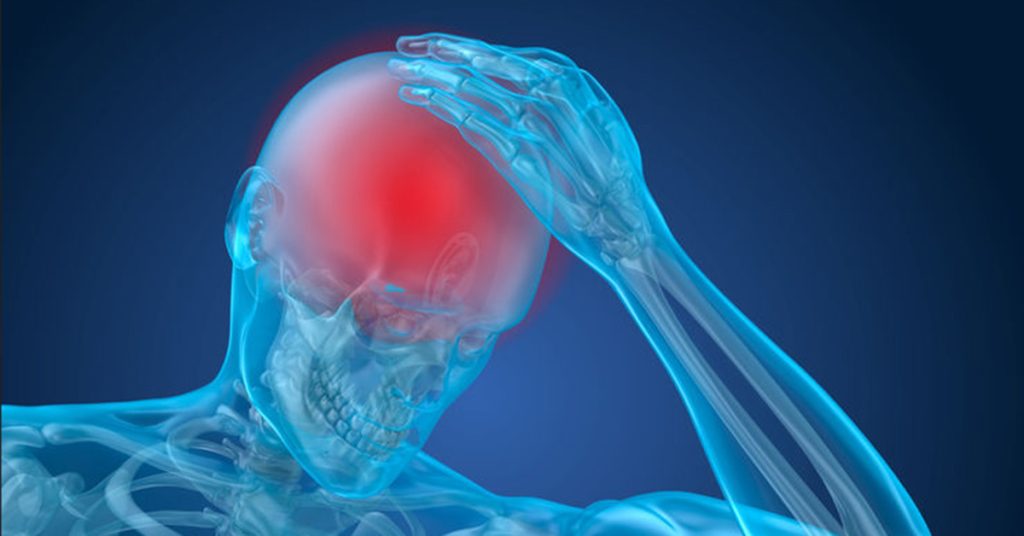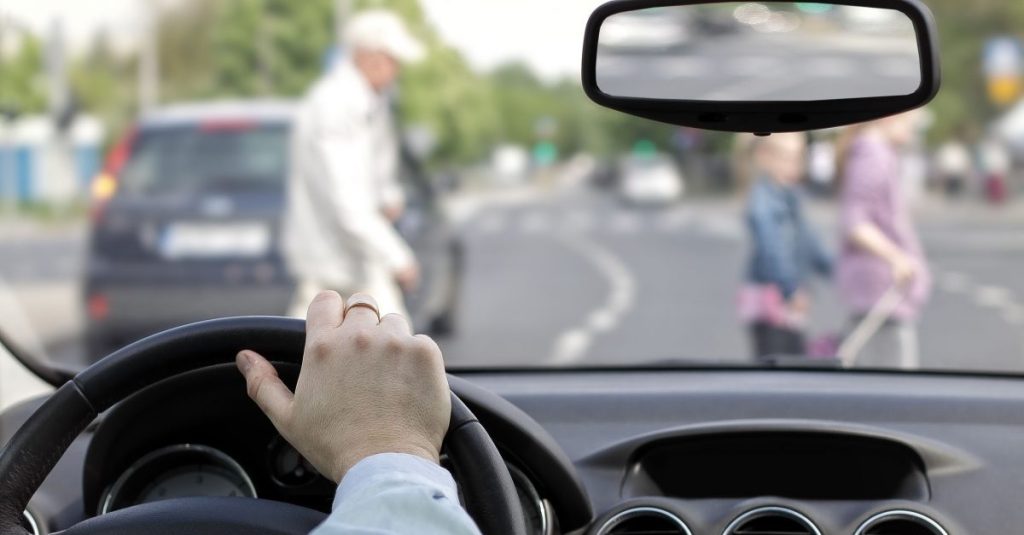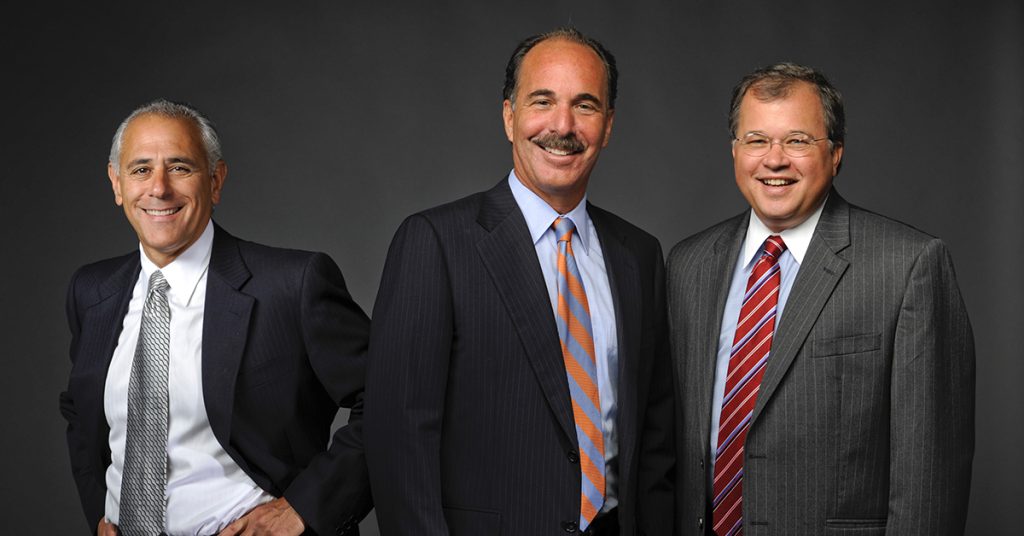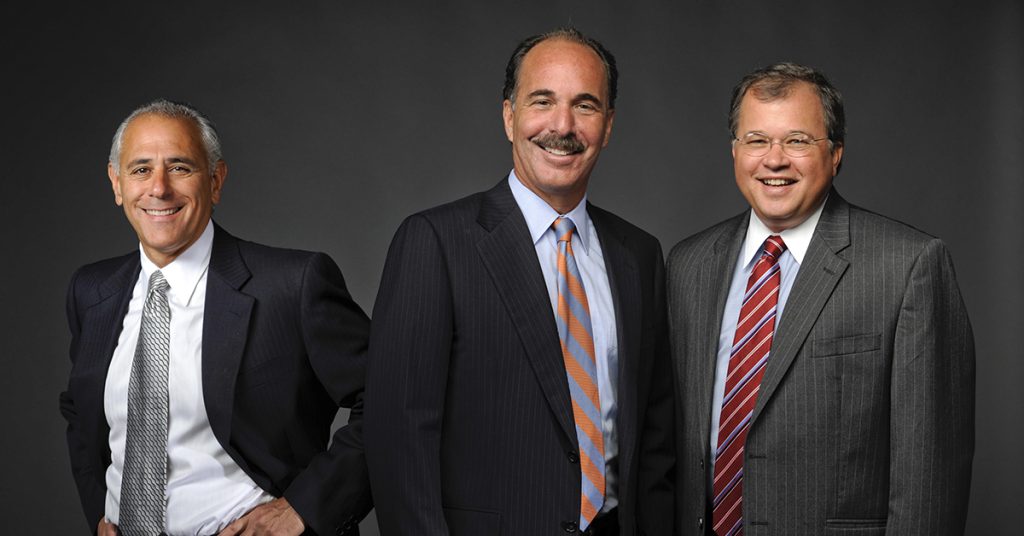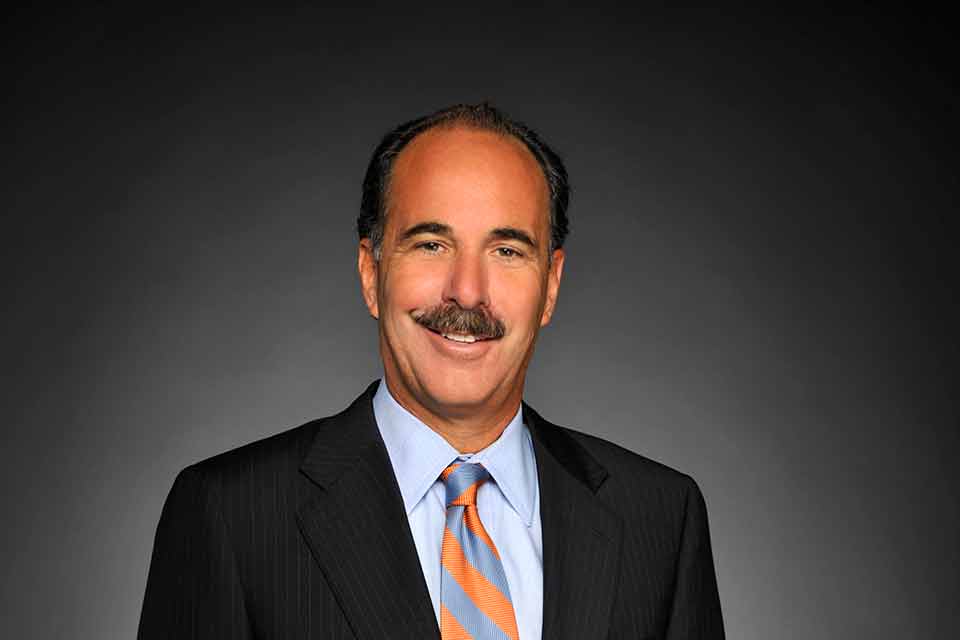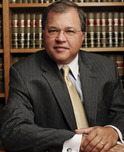Negligence
March is Brain Injury Awareness Month

March is Brain Injury Awareness Month. Take the opportunity to learn
Today, there is greater awareness around brain injuries. As a result, many people are treating brain injuries earlier and living healthier lives.
The Centers for Disease Control and Prevention (CDC) observes Brain Injury Awareness Month in March, to provide education about potential concussion symptoms, ongoing research and the needs of those living with a brain injury. This comes at the right time for families, as many children and teenagers plan to participate in spring sports.
Many brain injuries are caused by car accidents, falls or violence. But over the past decade, we have learned more about young children and student athletes suffering concussions on the sports field. In fact, from 2010 to 2016, nearly two million children were treated in emergency rooms for sports-related traumatic brain injuries (TBI), according to the CDC website. Sports associated with the highest number of ER visits: football, cycling, basketball, playground activities and soccer.
Among males 17 and younger, football was involved in 27 percent of all sports-related TBI visits to the ER, more than any other activity. In the same age group, females playing soccer, playground activities and basketball made the highest number of ER visits for TBI. Among children under 5, playground activity resulted in the most ER visits for TBI.
As we continue learning about injuries to children and student athletes, research continues to show older Americans are highly vulnerable to brain injuries. They are the most likely to be hospitalized for TBIs, according to the CDC.
At Breakstone, White & Gluck, our attorneys encourage you to look at the CDC website so you can be informed about the symptoms of traumatic brain injury and concussion. If you observe symptoms in yourself or your children, immediately call your doctor to be examined. Also guide older family members to medical treatment. This is paramount because a brain injury left untreated can result in long-term impairment or death. When someone receives immediate treatment, effective diagnosis and management early on is critical.
What is a Traumatic Brain Injury?
According to the CDC, a traumatic brain injury can be caused by a bump, blow or jolt to the head. There are traumatic brain injuries and mild traumatic brain injuries, which are often called concussions.
What are the Symptoms of a Traumatic Brain Injury?
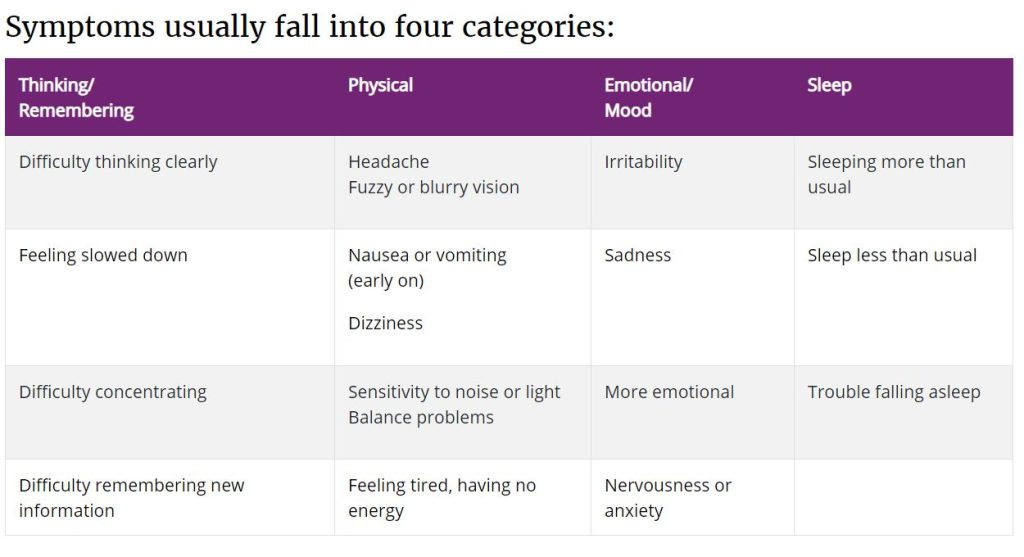
Concussion Symptoms. Courtesy CDC Website
You may observe some of these symptoms immediately after someone sustains a brain injury. Or symptoms may not emerge for several days. It’s also important to note that not everyone experiences the same symptoms.
Symptoms include difficulty thinking, concentrating or remembering or feeling slowed down.
Physical symptoms may include headaches, nausea, vomiting or fatigue. Some people are sensitive to noise or light. Others have trouble balancing themselves.
When someone suffers a head injury, it’s common for their sleep to be disrupted. They may sleep more or less than normal. Another sign is having trouble falling asleep. More extreme emotions are another symptom. The person may be irritable, sad, more emotional or exhibit high anxiety and nervousness.
Younger children may exhibit some of the above symptoms, but parents should also watch for crying inconsolably, more temper tantrums or getting easily upset and having trouble keeping up with skills they are learning (toilet training for instance). They may also lack interest in their normal activities.
Sports-Related Concussions and TBI in Massachusetts
Be aware of how concussions happen. After a car accident or truck accident, always receive immediate medical attention to make sure you have not suffered a TBI. When an elderly relative slips or a child falls on the playground, check in with the doctor. Do this anytime you observe someone suffer from any type of physical impact to the head.
When you sign your child up to play a sport, ask the coaches for the concussion protocol. In Massachusetts, middle and high schools are required to have documented procedures regarding concussion injuries and prevention. Passed in 2010, M.G.L. c.111 § 222 requires parents and students to participate in concussion awareness training so they can recognize symptoms and receive early treatment. The law also requires students to be removed from play if they may have suffered a concussion. They can only return with medical clearance.
Under the law, public middle and high schools and those subject to Massachusetts Interscholastic Athletic Association (MIAA) regulations must have concussion protocols. Other sports leagues are not required under Massachusetts law, but they should all have a concussion policy on their website.
Final Note
- At home, educate older children about TBI symptoms. Ask them questions when you sense something may be off and use the above chart to determine whether you may need to call the doctor.
- Ask for concussion safety protocols at schools and daycare centers, and when children participate in sports leagues. Attend concussion trainings.
- Watch younger children and older adults closely. Remember young children may not be able to communicate symptoms and pain with you and older adults may not recognize symptoms in themselves, especially if they have other medical conditions.
- Recruit as many family members as you can in watching for signs in young children, teens and the elderly.
- Visit some of the online resources below and share them with family members.
Concussion Prevention Resources for Families
Massachusetts Law on Concussion Prevention in Sports
105 CMR 201.00: Head injuries and concussions in extracurricular activities
Additional Resources
Heads Up to Brain Injury Awareness Training, CDC
Facts About Concussion and Brain Injury – Where to Get Help, CDC (a resource for all ages)
Sports Related Concussions and Head Injuries, Mass.gov
Concussion Trainings, Massachusetts Department of Public Health
Returning to School After a Concussion, Mass.gov
About Breakstone, White & Gluck – Boston Personal Injury Lawyers
With more than 100 years combined experience, Breakstone, White & Gluck of Boston is one of the most respected personal injury law firms in Massachusetts. Our attorneys represent individuals who have suffered traumatic brain injuries or mild traumatic brain injuries due to the negligence of another individual, organization or corporate entity.
If you have been injured, learn your legal rights for seeking financial compensation and obtaining medical care. For a free legal consultation, call Breakstone, White & Gluck at 800-379-1244 or 617-723-7676 or you can use our contact form.
Protecting Older Pedestrians From Car Accidents in Massachusetts
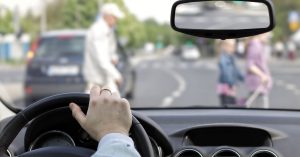
Massachusetts state officials are working to improve safety for older pedestrians.
When the snow falls, Massachusetts becomes more treacherous for everyone who walks. Older pedestrians are particularly vulnerable.
Massachusetts now has more than one million residents who are 65 or older – or roughly 15 percent of our population, according to a recent report, “Risk Factors for Older Pedestrian Injuries and Fatalities in MA.” The report was prepared for the Massachusetts Department of Transportation (MassDOT) in August 2019.
As Massachusetts residents live longer, many are more likely to be out walking for health or transportation. The state report identifies common risks to older pedestrians:
Winter Months. Researchers studied 4,472 pedestrian crashes across Massachusetts between 2006 and 2015, reporting crashes involving older pedestrians peak at 5 p.m. and during the month of December. November and January are also high risk months for older pedestrians, as they navigate darker conditions. When snow and ice is not cleared, sidewalks, parking lots and driveways can also contribute to unsafe conditions, as do drivers who fail to look for pedestrians and stop at crosswalks.
Causes of Older Pedestrian Crashes. Drivers who caused older pedestrian crashes were often inattentive, failed to yield the right of way or had trouble with visibility.
Where Older Pedestrians Were Hit. Older pedestrians were often hit at crosswalks at intersections, where they should have safety protections.
Where Older Pedestrians Crashes Occur. Researchers found Cambridge, Fall River, Lynn and New Bedford among the the top communities for highest number of older pedestrian crashes and the highest per capita.
Changing Face of Pedestrian Accidents. Crash rates involving “younger old” pedestrians – those between age 55 and 74 – increased. Crash rates among older pedestrians (75 and older) remained consistent.
Community Health. Communities with higher rates of disability reported greater rates of older pedestrian crashes. These included the urban neighborhoods of Boston, Lawrence and Chelsea.
Community Amenities. Communities with a high number of cultural amenities within walking distance – such as libraries and fitness centers – had higher crash rates among older pedestrians.
Not Just Older Pedestrians in Massachusetts. This state report comes as pedestrian fatalities rise across the country. Last March, the Governors Highway Safety Association announced a 35 percent increase in pedestrian deaths from 10 years ago (Streets Blog). This was the highest number of pedestrian fatalities since 1990.
Nationally, research shows 48 percent of pedestrian fatalities involved victims 50 and older, according to the Massachusetts study. Meanwhile, Massachusetts reports half of all pedestrian fatalities involve a pedestrian 55 and older.
Report Recommendations
The state report recommends work to protect older pedestrians be tied in with the Governor’s Council to Address Aging in Massachusetts, which was established in 2017. Among other advisories, the state report also sought infrastructure improvements in certain communities and creation of a winter public awareness campaign aimed at protecting older pedestrians.
Our Safety Tips for Pedestrians During Winter
Wear Neon. Pedestrians can make themselves more visible to traffic by wearing neon colors and neon reflective tape. Consider buying neon jackets, vests, hats and gloves to stand out.
Our Safety Tips for Drivers During Winter
Stop at Crosswalks. Make eye contact with pedestrians at crosswalks. Stop as they cross.
Other Drivers. Stop if you are approaching a driver who has stopped for a pedestrian at a crosswalk. Allow the pedestrian to completely cross the street.
Avoid Night Driving At Times. If you are overtired or are having trouble seeing at night, don’t drive. Make an appointment to have a doctor check your vision. Wear your eyeglasses as prescribed when you drive.
Limit Alcohol Consumption. Never drive while intoxicated. Use the designated driver system.
Free Legal Consultation – Boston Personal Injury Lawyers
With over 100 years combined experience, Breakstone, White & Gluck has been consistently recognized for our results in personal injury cases in Massachusetts, including by Top 100 New England Super Lawyers and U.S. News Best Law Firms. If you or a loved one has been injured by someone’s negligence, it is in your best interests to consult an experienced personal injury lawyer. For a free legal consultation, contact our attorneys at 800-379-1244 or 617-723-7676 or use our contact form.
2019 Year in Review from Breakstone, White & Gluck
Marc L. Breakstone, David W. White and Ronald E. Gluck founded Breakstone, White & Gluck in 1992. This year, our partners and our associate Reza Breakstone continued our practice, delivering superb and meaningful results to our clients in injury cases:
Attorney Marc L. Breakstone Interviewed About Lynnway Auto Auction Indictments
In March, Attorney Marc L. Breakstone was interviewed by WHDH TV about the criminal indictments returned against the Lynnway Auto Auction and its company president. Each was charged with five counts of manslaughter in the 2017 crash killing five people. Attorney Breakstone is representing one of the families who lost a loved one.
Attorney David W. White Interviewed by NBC Boston on E-Scooters
Attorney David W. White was interviewed by NBC Boston for a segment called, “Are You Protected in a Scooter Crash? Experts Say Read the Fine Print.”
Attorney Ronald E. Gluck Negotiates $1.6 Million Settlement for Client Who Suffered Concussion and Mild Traumatic Brain Injury
Attorney Ronald E. Gluck negotiated a $1.6 million settlement for a client who suffered a concussion and mild traumatic brain injury. Attorney Gluck discusses his work for clients in this area:
Project KidSafe and Community Outreach
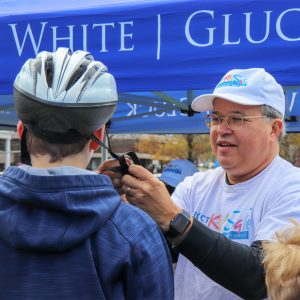 In April, Breakstone, White & Gluck launched our 7th annual Project KidSafe campaign with a bike helmet giveaway at Framingham Earth Day. We recently concluded another successful year, donating more than 4,000 bicycle helmets to children across Massachusetts. To reach children and families, our firm partnered with more than 35 community organizations, including 12 police departments, schools and bicycle committees, along with MassBike and Massachusetts Safe Routes to School.
In April, Breakstone, White & Gluck launched our 7th annual Project KidSafe campaign with a bike helmet giveaway at Framingham Earth Day. We recently concluded another successful year, donating more than 4,000 bicycle helmets to children across Massachusetts. To reach children and families, our firm partnered with more than 35 community organizations, including 12 police departments, schools and bicycle committees, along with MassBike and Massachusetts Safe Routes to School.
With this year’s donations, our attorneys have now given away more than 25,000 helmets, with a goal of protecting children on bicycles, preventing head injuries and saving lives.
As we made our last helmet donation of 2019, we were especially touched by kind words from Boston Police Commissioner William Gross:
Outside our Project KidSafe campaign, we supported many bar and community organizations, including the Massachusetts Bar Association and Massachusetts Academy of Trial Attorneys. In January, we supported and participated in the Equal Justice Coalition’s Walk on the Hill, when lawyers across the state advocate for increased state funding for civil legal aid.
Attorney Marc L. Breakstone Published in MATA Journal
In May, Attorney Marc Breakstone was published in the MATA Journal, with an article called, “Assessing bias in voir dire after ‘Williams.’
Attorney Ronald E. Gluck Successfully Resolves Mild Traumatic Brain Injury Case Caused by Heavy Snow Collapse
In May, Attorney Ronald E. Gluck announced he had successfully resolved a mild traumatic brain injury case for our client, who was injured when heavy snow collapsed from a commercial warehouse roof onto her vehicle.
Attorney Marc L. Breakstone Wins $1.1 Million Verdict in Rhode Island Case
In May, Attorney Marc L. Breakstone won a $1.1 million verdict for our client who was injured in a car accident.
Awards: Best Lawyers in America© 2020
In August, Attorneys Marc L. Breakstone, David W. White and Ronald E. Gluck were selected for inclusion to the Best Lawyers in America© 2020. Our attorneys were recognized for their excellent work in personal injury, medical malpractice, professional malpractice and insurance law cases.
Attorney Marc L. Breakstone Reaches $2.15 Million Settlement in Wrongful Death Case After Crash in Unsafe Parking Lot
In October, Attorney Marc L. Breakstone announced he had negotiated a $2.15 million settlement on behalf of his client’s estate.
Awards: 2019 Super Lawyers
In October, Attorneys Marc L. Breakstone, David W. White and Ronald E. Gluck were all recognized in the 2019 Super Lawyers rankings. Our firm honors included Top 100 New England Super Lawyers, Top 100 Massachusetts Super Lawyers and Massachusetts Super Lawyers recognition in the areas of personal injury and medical malpractice. Our attorneys were recognized for the 16th year.
Awards: Best Law Firms of America© 2020
In November, Breakstone, White & Gluck was recognized in the 2020 Edition of U.S. News – Best Lawyers “Best Law Firms.” Our firm received rankings as a Tier 1 Boston law firm in personal injury litigation representing plaintiffs and a Tier 1 Boston law firm in medical malpractice litigation representing plaintiffs.
Attorney Marc L. Breakstone Published in MATA Journal
In November, Marc L. Breakstone was published in the MATA Journal, with an article called, “Establishing Liability: Through the Defendant.”
Free Legal Consultation – Breakstone, White & Gluck – Personal Injury Lawyers
Breakstone, White & Gluck has more than 100 years combined experience representing clients in cases involving personal injury, wrongful death, medical malpractice, motor vehicle accidents, bicycle accidents, pedestrian accidents, head injuries, construction accidents, premises liability and product liability. If you or a loved one has been injured, contact our attorneys for a free legal consultation and learn your legal rights: 800-379-1244 or 617-723-7676. You can also use our contact form.
Breakstone, White & Gluck Recognized by Super Lawyers
It is our pleasure to announce that Super Lawyers has recognized Breakstone, White & Gluck in its 2019 rankings. This was the 16th year our attorneys have been recognized.
Marc L. Breakstone has been selected to the Top 100 New England Super Lawyers, Top 100 Massachusetts Super Lawyers and the 2019 Massachusetts Super Lawyers list, recognized as a top-rated medical malpractice attorney in Boston.
David W. White has been selected to the 2019 Massachusetts Super Lawyers list, recognized as a top-rated personal injury attorney in Boston. Attorney White has previously been selected to the Top 100 Massachusetts Super Lawers seven times and to the Top 100 New England Super Lawyers three times.
Ronald E. Gluck has been selected to the 2019 Massachusetts Super Lawyers list, recognized as a top-rated personal injury attorney in Boston.
Super Lawyers is a rating service which highlights outstanding lawyers from more than 70 practice areas. Selections are made using a multiphase process, including a statewide survey of lawyers, independent research and evaluation and peer reviews from within a practice area.
Super Lawyers recognizes the top 5 percent of lawyers from that process. Another 2.5 percent of attorneys are selected to the Rising Stars list, which showcases talented attorneys under age 40.
About Breakstone, White & Gluck
Over 100 Years Combined Experience in Personal Injury Plaintiff Representation
Breakstone, White & Gluck is respected across Massachusetts for our commitment to our clients and our results. We have been representing plaintiffs in personal injury and medical malpractice cases as a firm since 1992. Each of our partners has over 30 years of experience.
Our firm is experienced in handling all types of personal injury cases, including those involving catastrophic accidents, wrongful death, motor vehicle accidents, product liability, premises liability, construction accidents, explosions, spinal cord injuries, head injuries and traumatic brain injuries. Our attorneys are regularly interviewed in the local media for their expertise in these specialties and Massachusetts insurance laws.
We have always been active in the Massachusetts legal community and are dedicated to sharing our knowledge with other attorneys through continuing legal education and professional organizations. Attorney Marc L. Breakstone and Attorney Ronald E. Gluck serve on the Board of Trustees for the Massachusetts Academy of Trial Attorneys (MATA), while Attorney David W. White is a past president of the Massachusetts Bar Association. We are also committed to giving back and working to prevent injuries. Through our Project KidSafe campaign, our attorneys have given away more than 25,000 free bicycle helmets to children across the state of Massachusetts.
We invite you to visit our website to read about our work and watch testimonials from past clients.
Free Legal Consultation – Breakstone, White & Gluck
If you have been injured, you should speak to an experienced Boston personal injury lawyer and learn your legal rights for seeking financial compensation. For a free consultation, contact us at 800-379-1244 or 617-723-7676. You can also use our contact form.
Attorney Marc L. Breakstone Tells Boston Globe: Kevin Spacey Civil Lawsuit is Over
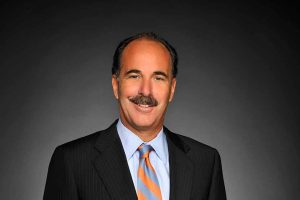
Attorney Marc L. Breakstone was interviewed this past weekend about the civil and criminal cases against actor Kevin Spacey. Breakstone said the accuser’s decision to withdraw the civil lawsuit “with prejudice” is extremely significant.
“This will never be refiled,” Breakstone told The Boston Globe. “This claim is now extinguished for all time.”
The accuser, who is the son of former Boston television anchor Heather Unruh, just filed the civil lawsuit in Nantucket Superior Court on June 26. Breakstone said the withdrawal of the civil lawsuit could mean Spacey has reached a settlement with the accuser. If there is such an agreement, Breakstone said, there will likely be confidentially requirement to keep the details private and out of public view.
Spacey and his legal team are scheduled to return to Nantucket District Court this morning for a hearing in the criminal case. Breakstone said withdrawal of the civil lawsuit could jeopardize the criminal proceedings, but prosecutors interviewed by The Boston Globe insisted the civil case will not affect the criminal proceedings.
Kevin Spacey is a two-time Oscar winner best known for his role on “House of Cards,” a Netflix production. He played the character of Frank Underwood from 2013 through 2017, when he was charged with indecent assault and battery in Nantucket. Netflix kept producing the show, but cut ties with Spacey.
Spacey is accused of indecent assault and battery on Unruh’s son in July 2016 at Nantucket’s Club Car Restaurant.
About Breakstone, White & Gluck
The Boston personal injury lawyers at Breakstone, White & Gluck have over 100 years combined experience representing those injured by the negligence and wrongdoing of others. If you have been injured, learn your rights. For a free legal consultation, 800-379-1244 or 617-723-7676. You can also use our contact form.
Massachusetts Nursing Homes Reach Settlements in Negligence and Deaths
Attorney General Maura Healey has announced seven Massachusetts nursing homes have agreed to pay settlements ranging from $30,000 to $200,000 to settle allegations of substandard care or regulatory violations. The AG’s office investigated and found several cases of injury and deaths in the nursing homes. In addition to fines, the facilities had to agree to implement three-year compliance programs, which include monitoring, audits and training. As a result of these investigations, two nursing home professionals agreed not to do business in Massachusetts for the next seven years. They have closed one of their nursing homes and are in the process of selling the other.
The settlements highlight the fact that many elderly patients regularly face nursing home neglect, unsafe conditions and inexperienced staff in Massachusetts nursing homes.
Jewish Nursing Home of Longmeadow
This nursing home will pay $85,000 to resolve allegations that it knew and failed to update inadequate bed rails, resulting in one patient’s death and serious injuries to a second patient. The nursing home had neglected to install new federally-compliant bed rails. As part of the settlement, Jewish Nursing Home of Longmeadow must participate in a three-year compliance program, during which it will focus on updating policies and procedures, conducting annual training programs and annual audits.
Woodbriar Health Center of Wilmington and Braemoor Health Center of Brockton
Synergy Health Centers agreed to pay between $100,000 and $200,000 to settle the AG’s allegations that the staff caused delays in delivering medical care, contributing to the deaths of two patients. In addition, the AG’s office reports that Woodbriar Health Center in Wilmington is being sold and Braemoor Health Center in Brockton has been closed.
Woodbriar Health Center is located in Wilmington in Middlesex County, near Burlington. There was a very serious incident there; a patient fell from a mechanical lift under a certified nursing aide’s watch. The staff then failed to communicate the patient’s X-ray results to her physician, delaying medical care. The state found the fall, communication failures and delay in care were “substantial contributing factors” in her death.
Braemoor Health Center, a Brockton nursing home south of Boston, was where the staff tried to resuscitate a patient who stopped responding during feeding. The staff failed to report the death to the Massachusetts Department of Public Health in a timely way.
Beaumont Rehabilitation and Skilled Nursing Center of Westborough
Owned by Salmon Health and Retirement, Beaumont was accused of failure to establish safeguards to protect nursing home patients from falls. As a result, one patient fell 20 times. The last time, Beaumont did not call a nurse practitioner to evaluate her injury. Another mistake was the patient was not given pain medication before she died. The nursing home will now pay $37,500 to resolve the allegations and implement a three-year compliance program.
The Rehabilitation and Nursing Center at Everett
The nursing home was treating a patient with a history of escaping. The patient was on a “secure unit” but still managed to escape through several unlocked doors. Further, the home neglected to maintain the patient’s medical record for two months before the escape. The nursing home must now begin a compliance program, which will in part focus on staff retraining.
Wakefield Center
Owned by Genesis Health Care, the Wakefield Center will pay $30,000 and implement a compliance program to resolve allegations that a nurse’s inadequate training contributed to a patient’s death. The AG alleged the nurse did not accurately transcribe the patient’s medication order, which resulted in a blood clot and ultimately, the patient’s death.
Free Legal Consultation – Boston Nursing Home Neglect Lawyers
Since 1992, Breakstone, White & Gluck of Boston has represented patients injured by the negligence and wrongdoing of nursing homes and medical professionals. Families place their trust in nursing homes and nursing homes have a duty to follow the patient’s medical care plan, properly administer medications and follow state and federal safety regulations. Injuries can happen when nursing homes neglect patients, under staff or hire inexperienced professionals.
If you or a loved one have been injured by nursing home negligence, learn your legal rights. For a free legal consultation, contact Breakstone, White & Gluck at 800-379-1244 or 617-723-7676 or use our contact form.
Attorney Marc Breakstone Provides Legal Commentary in Boston Globe Article on Former Student’s Negligence Lawsuit Against Worcester Polytechnic Institute
Attorney Marc Breakstone commented as a legal expert in a Boston Globe article this week on Worcester Polytechnical Institute’s (WPI) response to a negligence lawsuit, brought by a former student who was raped while studying abroad. The college responded that the student was partially responsible.
“It’s a strategy that, frankly, often backfires in trial because the jury gets incensed,” Attorney Breakstone said.
This is a comparative negligence argument. This is traditionally an argument defense lawyers try and make for slip-and-fall cases or other accidents. In these cases, juries are left to assign a percentage of blame on the defendant and the plaintiff. In this case, Attorney Breakstone called the use, “repugnant.”
According to The Boston Globe, the student was raped in Puerto Rico, by a security guard who worked at the apartment building where students lived. The security guard was a convicted felon at the time. He has since been convicted for her rape and is now serving a 20-year prison sentence.
The student and her parents have sued WPI, alleging the school failed to properly ensure the apartment building was safe for students. The lawsuit was filed against WPI and several administrators and seeks unspecified damages from the college, including legal costs.
In response, WPI’s attorneys have asserted the victim was partially responsible because she ignored the information and training provided by the college, as well as her own common sense, and she drank excessively that night and followed the security guard onto the roof, where the crime occurred.
About Attorney Marc Breakstone
Attorney Marc Breakstone has established a reputation as one of the top medical malpractice and personal injury lawyers in Massachusetts and New England. He has represented clients in Massachusetts for 30 years. He works tirelessly to ensure his clients receive full and fair compensation as well as achieve the most favorable medical result.
He has been recognized as a Top 100 New England Super Lawyer, a Top 100 Massachusetts Super Lawyer and a Massachusetts Super Lawyer in Plaintiff’s Medical Malpractice. He regularly provides legal commentary to the media on complex cases involving negligence, medical malpractice and transportation.
About Breakstone, White & Gluck
The Boston personal injury attorneys at Breakstone, White & Gluck have over 100 years combined experience handling motor vehicle accident cases resulting in serious personal injury or wrongful death. If you have been injured, it is important to learn your rights. For a free legal consultation, contact us at 800-379-1244 or 617-723-7676 or use our contact form.
Housing Code Violations and Over-Crowding in Boston Student Housing
The fire on April 26, 2013 at 87 Linden Street in Allston, the second serious fire in less than two years on the same block, is a tragic reminder of what can happen with overcrowded, substandard student housing.
The Fire Marshall will now investigate the cause of the Allston fire. In addition, The Boston Inspectional Services Division should examine whether the unit was overcrowded in violation of the Boston Zoning Ordinance, and whether housing codes and accessibility codes were violated. Enforcement of city ordinances is, unfortunately, inconsistent, and usually after the fact. Knowing this, landlords and realty companies frequently violate these ordinances in the name of profits. The victims are often unsuspecting college students. As a result, students, who pay high rents, are subjected to increased risks from their overcrowded housing.
The law in Massachusetts governs how homes must be safely maintained in order to prevent personal injury to occupants of the property. In Boston, zoning ordinances require building owners to declare whether their properties are single-family or multi-family units. In either case, under Boston’s zoning ordinances, under the definition of “family,” no unit may be occupied by more than four unrelated students unless the building meets much stricter building requirements.
It is also generally illegal for a landlord to create bedrooms in basements, and it may be against code to create a bedroom in an attic. No matter how it is configured, every house or apartment must have working smoke detectors throughout the unit.
Once a unit exceeds the four unrelated-occupant threshold, it technically becomes a rooming house, which makes it subject to very strict fire-prevention regulations under M.G.L. c. 148, Sec. 26I and other regulations. For example, a rooming house must have walls and ceilings made from fire-rated materials to slow flames in the event of a fire. Smoke detectors must be in every bedroom,
and must be interconnected. Even more important, every boarding house must have a working sprinkler system. Boarding houses must also meet accessibility guideline and provide multiple means of egress for upper floors, which may include fire escapes.
Real estate brokers and leasing agents share responsibility for student overcrowding and exposure to risk from substandard housing. A quick look at any leasing agent’s website will reveal scores of units available for student occupancy which are intended to house more than four unrelated individuals. Leasing agents collect a single month’s rent, sometimes more, for their services. Since they also take the responsibility to collect signatures on leases, they know exactly how many students will be in the unit. Leasing agents simply cannot claim ignorance of the laws regarding overcrowding.
Who May Be Liable
It is our firm’s opinion that violations of the boarding house rules are evidence of negligence and may create liability for the responsible landlord.
We also believe that knowing and willful violations of the boarding house rules by real estate companies or leasing agents may subject them to liability as well. Violations of these standards may also be violations of the Massachusetts Consumer Protection Act, which may subject landlords and their leasing agents to multiple damages and attorneys’ fees.
Other Cases
Injuries and death from substandard housing may also lead to criminal charges against landlords. For example, in January 2012, two absentee landlords were convicted of manslaughter after a fire in an illegal apartment in Quincy led to the deaths of three tenants. The landlords were accused of wantonly violating building and fire codes.
The question of the enforceability of rooming house regulations is also pending at the Massachusetts Supreme Judicial Court. In that case, civil claims were brought against a Worcester landlord for violation of the Worcester zoning bylaw. In that city, no more than four unrelated persons can occupy a home. The city brought the violation because there were more than four students in the unit. The decision in that case is expected to be handed down in the next few weeks.
Update: The City of Boston later cited the owner of the two-family structure, Anna Belokurova, for running an illegal rooming house and not obtaining the permits needed to create bedrooms in the basement, according to The Boston Globe. Read more.
Related Articles:
Woman killed, firefighters and occupants injured in raging Allston fire, Boston Herald.
One dead, 15 injured in Allston house fire, The Boston Globe.
Jury finds landlords guilty of involuntary manslaughter in Quincy apartment fire, The Patriot Ledger.
About Breakstone, White & Gluck
Breakstone, White & Gluck of Boston has over 85 years combined experience represented injured clients in Massachusetts. If you or a loved one has been injured, learn your rights. For a free legal consultation, contact us at 800-379-1244 or 617-723-7676 or use our contact form.
What Massachusetts Consumers Need to Know about Health Club Contracts

If you exercise at a health club, you may not be aware that Massachusetts law protects you in many ways from unlawful club contracts. But many local health clubs – yours may be included – are regularly violating the law.
Health clubs are serving larger numbers than in the past. Over 50.2 million Americans now hold gym memberships, a 10 percent increase over the past three years, according to the International Health, Racquet & Sportsclub Association.
The industry has been known to make it challenging for members to cancel or put their memberships on hold. Sometimes, after you sign the cancellation agreement, they require you to pay until month’s end, then another full “last month.” In addition to monthly membership fees, many are also now adding new fees for “annual” memberships and equipment maintenance. Some are even charging cancellation fees up to $200. This is still legal in Massachusetts, though not at all consumer friendly.
But did you notice the fees clearly posted the last time you visited your gym? If not, your gym is violating the law. The Massachusetts Office of Consumer Affairs and Business Regulation recently inspected 15 local health clubs and found none were displaying fees or informing consumers of their right to cancel within three days, according to WBZ-TV. The office is referring the results to the state Attorney General’s office.
Health clubs cannot ask a member to sign a waiver of liability but, surprisingly, many still do. While waivers of liability, also known as releases, are generally enforceable in Massachusetts, G.L. c. 93, Sec. 80 specifically states, “No contract for health club services may contain any provisions whereby the buyer agrees not to assert against the seller or any assignee or transferee of the health club services contract any claim or defense arising out of the health club services contract or the buyer’s activities at the health club.”
This means gyms have a duty to properly maintain their premises and equipment and make sure they are being used in a safe manner, according to the manufacturer’s guidelines. If they do not, and they were negligent, they may be responsible for your damages. If you have been injured in a Massachusetts gym, the court should find the liability waiver void. Over the years, our injury lawyers have successfully challenged these agreements.
Gyms also cannot ask members to sign up for terms longer than 36 months or require that members agree to financing that lasts longer than one month beyond the membership period. Members cannot be required to agree to monthly automatic withdrawals from a bank account.
If you are joining a gym, the best thing you can do is read the fine print on your member agreement before signing. Research the organization online through your local Better Business Bureau website.
Consumer remedies for health club violations are limited. No health club will be permitted by the courts to enforce an illegal contract. A consumer may bring claims under the Massachusetts Consumer Protection Act, G.L. c. 93A, but damages will usually be nominal, although attorneys’ fees would be available.
Recent Court Ruling
The possibility of class actions was virtually eliminated by the recent ruling by the Supreme Judicial Court in Tyler v. Michaels Stores, Inc., 464 Mass. 492 (2013). An invasion of a consumer’s rights may be a violation of G.L. c. 93A, but unless the consumer has suffered a separate, identifiable harm arising from the violation, there will be no remedy. This case put a disappointing crimp into collective consumer action to prevent violations of the Consumer Protection Act, leaving overworked state officials to take up the slack.
Good News for Massachusetts Consumers: SJC Affirms Damages Remedies in Insurance Bad Faith Case
Last week the Massachusetts Supreme Judicial Court issued an important and strongly pro-consumer decision in the case of Rhodes v. AIG Domestic Claims, Inc., 461 Mass. 486 (2012). The decision erased uncertainties created by an Appeals Court decision in the same case (78 Mass. App. Ct. 518 (2010). The decision sends the message that insurance companies will have to pay when they do not treat consumers fairly. Attorney David W. White has written an in-depth summary, which you can read by on our website.
In this case, the plaintiff’s car was hit from behind by an 18-wheel truck. The impact fractured her spinal cord and left her paraplegic. She also suffered broken ribs. She brought claims, along with her husband and her children.
The claims management company was AIG Domestic Claims, Inc. (AIGDC). The company delayed making a settlement offer, then finally made a very low one. Another offer came during trial, this one only slightly better.
The plaintiff rejected all offers and secured an $11.3 million judgement at a trial in Superior Court in September 2004.
Defendant appealed, and AIGDC failed to pay the judgment until after a c. 93A letter was sent and suit was instituted in a second action for violations of c. 93A and c. 176D.
Plaintiff prevailed, but appealed when they were not awarded full damages based upon the judgment.
The Appeals Court affirmed in part, but did not find the proper measure of damages should be based upon the judgement. The SJC granted further appellate review.
The SJC reversed. Affirming its earlier decisions in Hopkins v. Liberty Mutual Ins. Co., 434 Mass. 556 (2001) and Bobick v. United States Fid. & Guar. Co., 349 Mass. 652 (2003), the court held that plaintiffs did not have to show how they would have answered a settlement offer, if it had come. Rather, the court stated, “[i]t has been and remains the rule that the plaintiffs need only prove that they suffered a loss, or an adverse consequence, due to the insurer’s failure to make a timely, reasonable offer; the plaintiffs need not speculate about what they would have done with a hypothetical offer that the insurers might have, but in fact did not, make on a timely basis.”
The court also affirmed the trial court’s findings that the underlying insurer, Zurich, was not liable for violations of c. 93A.
The court held that the underlying judgment of $11.3 million should be the basis of the c. 93A judgment, and that it should be doubled.
Read more about this decision on our website.
About Attorney David W. White and Breakstone, White & Gluck
Breakstone, White & Gluck is a Boston personal injury firm which represents clients who have been injured in car accidents, truck accidents and other accidents. We have decades of experience handling c. 93A claims including insurance bad faith claims in Massachusetts. We look forward to the opportunity to assist referring counsel and clients with their 93A and c. 176D claims.
Attorney David W. White is a partner at the firm and is a past president of the Massachusetts Bar Association. He writes on cases involving c. 93A and c. 176D and is recognized on an expert in Massachusetts insurance laws. He frequently lectures on the insurance matters for Massachusetts Continuing Legal Education. Attorney White is a past president of the Massachusetts Bar Association.


